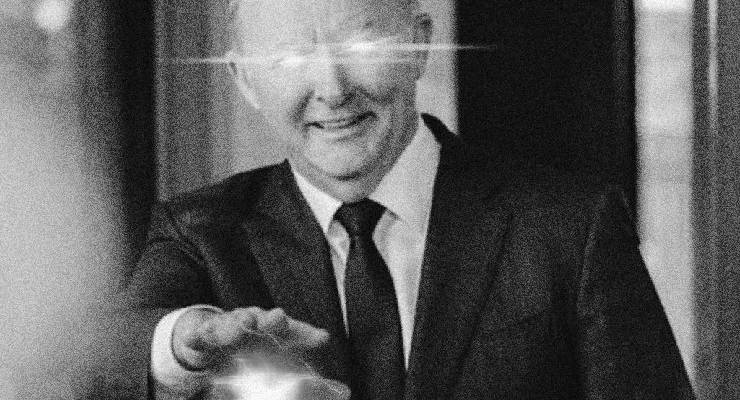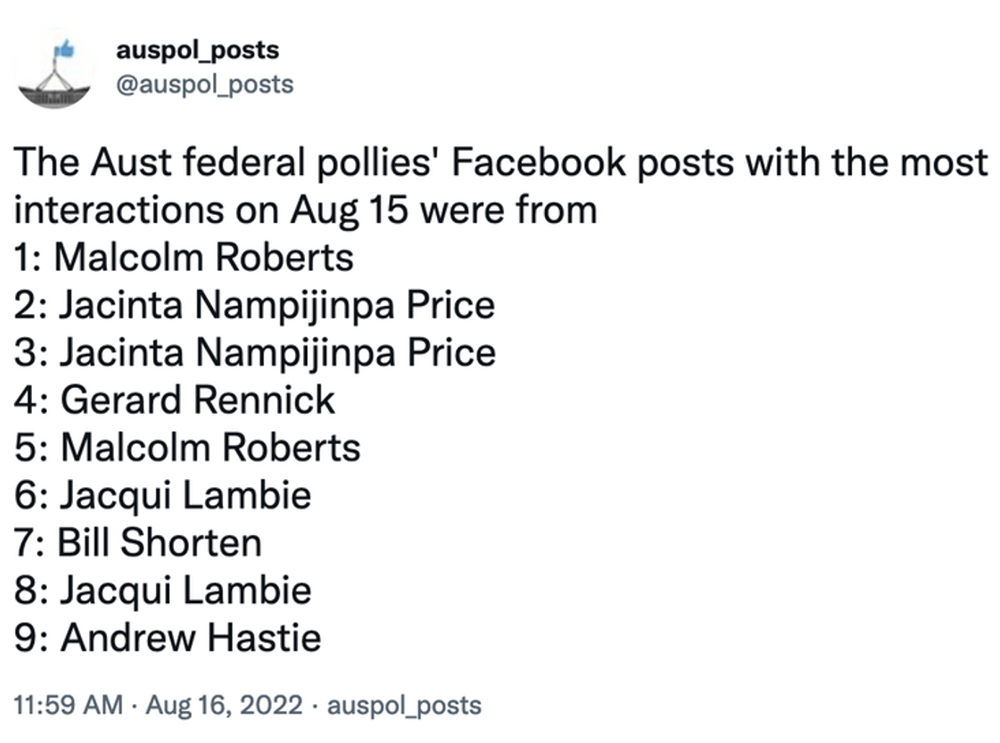
Trending
There’s an Australian politics Twitter account that ruins my day at least once a week. Created by friend of the newsletter Casey Briggs, @auspol_posts is an automated account that tracks which Australian politicians are doing well on Facebook.
Each day, the account tweets a list of the 10 Facebook posts from federal MPs that have received the most engagements on Facebook. Watching these provides an easy overview of which MPs (and their offices) have figured out how to get their message across on the platform.

The results are pretty clear: right-wing Australian politicians are dominating Facebook. I went back and looked at which politician had the top Facebook post each day since June 30 — when Briggs updated the bot for the 47th Parliament — to get a sense of how well they’re doing. I found that right-wing politicians (defined as Coalition or One Nation MPs) topped the list for 35 days, compared with 10 days for left-wing politicians (i.e. Labor or Greens).
In fact, it seems the more right-wing and populist you are, the better you do in these daily rankings. The most common names were Queensland LNP Senator Gerard Rennick, propelled by his relentless anti-vaccine posting; Country Liberal Senator Jacinta Price; former prime minister Scott Morrison; and One Nation senators Pauline Hanson and Malcolm Roberts. Prime Minister Anthony Albanese and Environment Minister Tanya Plibersek were the big names on the left.
The reason that this semi-regularly ruins my day is because it shows how the playing field is warped to reward a certain style of politics. Beyond dispelling the ridiculous persecution complex of a lot of right-wing politicians — who claim tech platforms are biased against conservatives and frequently “shadow ban” them — the clear imbalance of perhaps the most important information dissemination mechanism known to humankind should make people uneasy.
Despite probably having its best days behind it, Facebook remains the most popular social media platform, with 76.8% of Australians between 18-64 having an account and spending an average of 17.6 hours signed in each month, according to We Are Social’s 2022 State of Social report. Other platforms like Instagram and TikTok are becoming more important to politicians, but Facebook remained the major digital battleground for the 2022 federal election.
The right-wing advantage on Facebook is a well-documented phenomenon in the US. In 2020, an anonymous Facebook executive speaking to Politico acknowledged it was true but claimed it was because “right-wing populism is always more engaging”.
Sure, maybe. But that convenient explanation paints Facebook as an immutable force — almost like gravity — that Just So Happens to reward conflict and fear in politics. There are other platforms that don’t incentivise the same kinds of behaviour. Reddit, for one, shows there is another way.
We should always question how these platforms are encouraging us to act and whether that’s how we want the world to be.
Hyperlinks
Pubs are buying facial recognition technology to track and record you
I went to an expo for gambling companies in Australasia and I found out that pubs, clubs and other venues are already using facial recognition tech. (Crikey)
Meta missing in action at crucial Treasury talks
Add this to the evidence that Meta is not crazy about still paying for journalism in Australia. (SMH)
Punters seeking help for gambling addiction directed to betting websites
This is ghoulish. (SMH)
NSW Police dumps Bezos-backed Mark43 from core systems overhaul
Nice scoop: a company backed by Malcolm Turnbull that had been awarded a $177 million contract to provide cloud-computing services to NSW Police was dumped before it went live. (IT News)
Has Ron Watkins, who many believe is behind QAnon, moved to Australia?
Good news! One of the world’s most influential conspiracy theorists is in Australia — and there’s some evidence suggesting he might be trying to stay here. (Crikey)
Content Corner
The hot meme in American left politics at the moment is “Dark Brandon”. Inverting a fascist-y trope from the MAGA right, “Dark Brandon” is a meme that portrays US President Joe Biden as a dark, edgy and ruthless political leader who’s willing to do whatever it takes to carry out his policy agenda (as opposed to the rather feeble, unpopular reality of his presidency).
What started off as a subversion of a right-wing meme that was used ironically has subsequently been adopted by the US establishment left, including White House aides. This has led people to ask: is this meme ironic? Or is it now an earnest, delusional portrayal of Biden? Is it ultimately reinforcing extremist iconography? The answer to all of these is yes, depending on who you ask.
The question I’m more interested in is: why haven’t we seen a “Dark Albo” meme take off in Australia? Technically, it exists. There is a @dark_albo Instagram account that pretty much became inactive straight after the election (hmm, funny that).

What I actually mean is why isn’t there a meme format that casts Anthony Albanese as a strong political leader? I suspect there are a lot of causes, but for whatever reason Australia’s politics hasn’t embraced fandom to the same extent as our American equivalents. US writer Max Read explained the “Dark Brandon” meme as “developed and shared by people who spend several hours a day looking at screens, developing strong emotional attachments, and thinking about the complicated narrative arc of their preferred fictional metaverse”. In effect, meme-ing Biden taps into the same cultural stories cultivated by Marvel and DC.
Politics through the fandom lens isn’t quite as prevalent in Australia. It certainly exists (just have a look through some of the #Albo posts on Twitter) but not to the same level. Frankly, this is probably a good thing! It’s better to treat politicians as flawed vessels for their constituents and not characters who we have no choice but to unironically stan. If that means we miss out on some crispy “Dark Albo” memes, I guess that’s a price I’m willing to pay.








There are vast differences in the ways particularly the fringier elements of the right and most of the left consume media and participate in social media, and that’s largely what’s being reflected, moreso than the relative competency of the people making the content.
No government minister could afford to be clickbaity the way Malcolm Roberts can. There’s a finite group of people on the right who will hit like on ANYTHING that affirms their worldview because they feel de facto marginalised and providing a forum for convincing themselves that’s an illusion is one of the ways social media is damaging the public sphere.
Whereas people even at the fringes of the left are CONSTANTLY looking for heritics and heresy and view even content that afirms their worldview with a critical eye, and the most common response is “yes that’s great, but here’s my idea that’s even better, or here’s something you missed … whaddabout …”
Heck, what am I doing right now … ?
Perhaps this speaks more to Facebook as a platform, generally regarded as a bastion of Boomers and X-ers, than it does of right-wing politicians. Millennials and Gen-Z are voting en masse for Labor and the Greens, but they eschewing Facebook for the above mentioned Tiktok and Insta. These (and more upcoming platforms) will become more and more important as elections come and go.
The Facebook numbers may be much more reflective of those engaging on Facebook, and perhaps related to the character and intellectual capacity of those that do.
It’s been my unscientific observation that the more “outraged” a person is, the more likely they are to post, and post frequently. This naturally gives the numbers advantage to the right (being the party of outrage).
Also, more than 70% of Australians may have a Facebook account and spend time on it, but not engage. Many consume without commenting. They would not be counted in this metric, which is not measuring “information dissemination” at all.